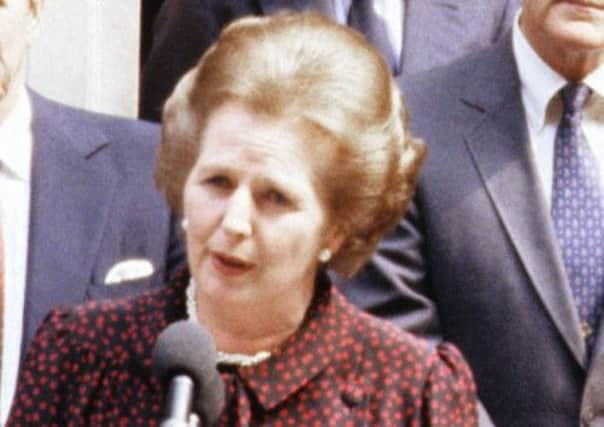Thatcher wanted Cecil Parkinson to be her successor


The news that ex-party chairman Mr Parkinson’s former secretary, Sara Keays, was pregnant with his child following a 12-year affair was first reported in October 1983 and eventually forced his resignation from the Cabinet.
Mrs Thatcher’s private papers from that year have now been made public and include documents which appear to confirm she was grooming him as her heir. They include unseen resignation letters, in which she describes the situation as “tragic”.
Advertisement
Hide AdAdvertisement
Hide AdTwo handwritten notes show that the then prime minister intended to promote Mr Parkinson, who became Lord Parkinson, to foreign secretary before the scandal broke.
In one she wrote simply: “F.S. C.P.”
The move has long been speculated about, but the notes are seen as the first solid evidence.
Chris Collins, from the Margaret Thatcher Foundation, is the only historian to have studied the archive. He said such a move would have catapulted Mr Parkinson up the party hierarchy, effectively anointing him as her successor.
“It’s only speculative that she considered him to be her successor, but it would appear that she was very serious about him indeed,” he said. “He had certainly risen very fast, and she knew that by promoting him in this way, she would create an atmosphere around him.”
Even before the affair was revealed, Mrs Thatcher – who became Baroness Thatcher – had been cautioned against elevating Mr Parkinson through the ranks too quickly.
Chief of staff David Wolfson wrote in a memo: “Cecil would also be in a position of immense power, and you must judge whether he has yet proved himself as a Cabinet minister.”
Mrs Thatcher was first made aware of the affair by Mr Parkinson on election day, 9 June, and soon after she received a letter from Ms Keays’s father.
Only brief reference to this exchange is contained in the documents.
Advertisement
Hide AdAdvertisement
Hide AdIn her reply to Colonel Keays’s letter, Mrs Thatcher wrote: “I understand that you have since spoken to the person concerned.”
A draft of this letter shows Mrs Thatcher removed the passage “and have asked that I should return your letter, which I now do” as she in fact decided to burn the letter in a fireplace at Chequers.
The revelation put paid to Mrs Thatcher’s plans for Mr Parkinson and she instead made him secretary for trade and industry.
Five months later, the scandal was reported on the front pages of several national newspapers and within a week Mr Parkinson resigned.
Also among the papers are drafts of Mr Parkinson’s resignation letter and Mrs Thatcher’s intended reply.
It is thought these letters were intended to be released to the press but never were – possibly because they would have provided further fuel for the story.
In her letter, Mrs Thatcher wrote: “I am saddened beyond words both by the loss of your contribution as a member of the government and by the tragic circumstances in which that loss has come about.”
She replaced the phrase “I am strengthened by the thought that we shall remain friends” with “I am cheered by the thought that we shall see you both often”.
Advertisement
Hide AdAdvertisement
Hide AdMr Parkinson begins his letter by stating: “It seems strange that after over eight years on the front bench as part of your team, I am now to be a spectator of events …”
• The archive is open online at www.margaretthatcher.org